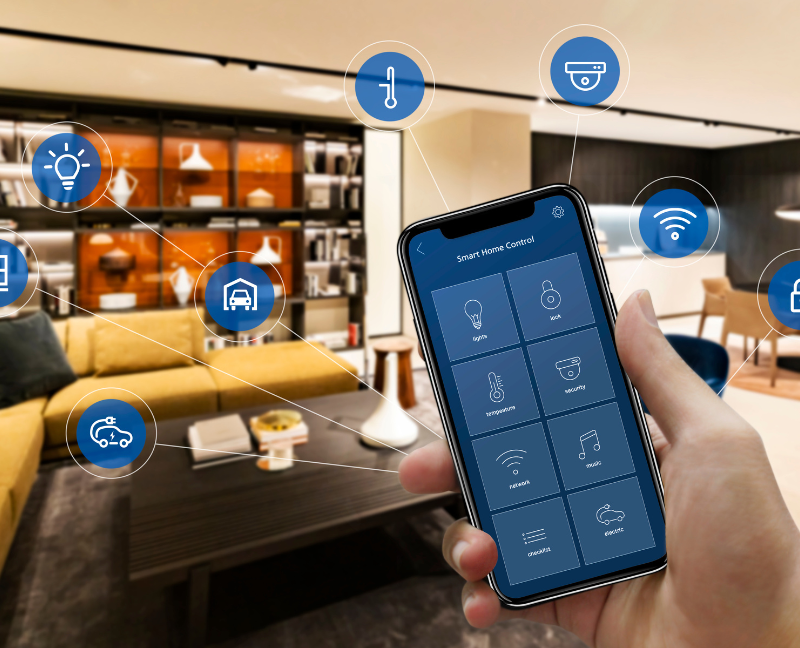Not only is buying a home exhilarating, but it's also one of life's greatest accomplishments. There are many advantages to having your own property, even though it might be difficult at some point.
Renting, on the other hand, can be a terrific short-term option for deciding where you want to live and for accumulating funds for your down payment on a home loan.
So, which one should you choose?
In this post, we’ll help you decide whether having a home or renting out is for you.
There are several benefits of renting a home, some of which include:
Flexibility: Renting a home offers a great deal of flexibility as you are not tied down to a long-term commitment. Most rental agreements are for a fixed period, after which you have the option to renew or move to another location. This makes renting a great option for those who frequently change jobs or move frequently.
Lower Upfront Costs: Renting a home requires a lower upfront cost compared to buying a home. You typically only need to pay a security deposit and the first month's rent, whereas buying a home requires a down payment, closing costs, and other expenses.
No Maintenance Costs: When you rent a home, the landlord or property manager is responsible for any maintenance and repairs. This means that you don't have to worry about unexpected expenses related to repairs, which can be a significant benefit.
Access To Amenities: Many rental communities offer access to amenities such as swimming pools, fitness centers, and laundry facilities. This can be a great perk for those who want to enjoy these amenities without having to pay for them separately.
No Property Taxes: As a renter, you are not responsible for paying property taxes. This can be a significant benefit as property taxes can be a significant expense for homeowners.
No Need To Worry About Resale Value: When you rent a home, you don't have to worry about the resale value of the property. This can be a great benefit if you are not interested in investing in real estate or if you don't want to deal with the stress of selling a property.

Increasing Equity: The value of the property you own represents your equity. When you pay off your mortgage or when the market value of your property rises, equity might naturally increase. Making additional mortgage payments can also help it grow.
If you've made additional payments to your loan, you may be able to redraw it or refinance for a cash-out. The money can then be utilized for remodeling, purchasing a new vehicle, or even as a down payment for a different home.
Living Security: The landlord, who may decide they no longer wish to rent out their property, is in charge of your position when you rent. Relocating is expensive, inconvenient, and emotional, to say nothing of all three. When you own your own house, you can rest easy knowing that you get to choose when to relocate.
Build The Home Of Your Dream: You can opt to completely redo the bathroom with a jungle theme or to paint the walls in vibrant colors without worrying about getting your bond back when you own your own property, giving you total creative freedom. House upgrades can raise a property's value, thus every dollar that your house has appreciated will be yours if you decide to sell. Get our guide to getting your home renovation off the ground.
Cost Management: Your rent may be increased regularly if you rent. While owning a home entails a variety of costs, including mortgage payments, council fees, and strata or property insurance, these costs are not likely to increase significantly overnight.
By selecting a fixed-rate home loan, you might in some cases even be able to keep your rates under control.
Save Cash: Although it may not seem like it, you might save money by making your mortgage payments. Many repayments combine principle and interest, allowing you to contribute some funds to expanding your home's ownership. Although renting could appear to be less expensive, you won't eventually get any of that value back.
Nonetheless, it has its own pros and cons. If you want to learn more about it, feel free to click this link or subscribe to our mailing list.
Thank you!
One of the major benefits of owning a home is equity. But what is equity, and why is it so valuable? Equity is the difference between the home's current worth and what is owed on the mortgage. Simply put, if you owe 200,000 on your mortgage loan and your home is worth $250,000, you have $50,000 of equity.
The primary driver of equity growth is the rising of home prices, and if you've been a homeowner in the past 5 years or so, you are in luck because your net worth got a boost due to the significant rise of home prices in the previous years. Even if home appreciation has slowed this year, doesn't mean you have lost all equity in your home.
According to the recent report on Homeowner Equity Insights that CoreLogic released, data has shown that the average homeowner gained approximately $34,300 in equity during the past year alone.
Why is equity valuable? Equity not only helps you increase your overall net worth but it can also be leveraged to help you achieve your other financial goals! Yes, you can tap your equity for a variety of investments.
Including:
If you think you can benefit from additional education but don't have the funds readily available, consider getting a home equity loan to pay for that education. Think of it as an investment in yourself and your future.
If you want to update your living space or if you are getting ready to sell, you can use your home equity to invest in home improvements. If you research properly what home improvements offer the best returns, this can even increase your home's value above and beyond its sticker price, which will help you build more equity on your property.
If you have a great business idea in mind and need financing to get your business up and running, a home equity loan is an easy and straightforward option.
If you are thinking of getting an investment property, you can use the equity in your home to buy another property.
Whatever your financial goals are, you can tap the equity you've gained over time to help you fuel your next move.
If you're interested in finding out just how much equity you have in your current home and how you can use it to fuel your financial goal, connect with your trusted RE/MAX Advanced Realty Agent, Today!
Your pets might be prepared to begin an exciting new chapter in a new home, but what about you? Even while some animal family members might find it upsetting to relocate to a new location, there are ways to help them adjust with a little forethought.
For homeowners, coexisting peacefully with pets is of utmost importance. According to the American Pet Products Association's APPA National Pet Owners Survey, at least one pet is owned by 70% of all U.S. households or around 90.5 million people. This is an impressive number that affects several economic sectors, including residential real estate.
Today's house buyers are looking for properties that represent how much people adore their pets. Some homebuyers find it easy to select a pet-friendly real estate in Indiana by choosing a residence with hard flooring, a fenced yard, or a litter box.
Some pet-friendly home plans accommodate the canine members of the family.
Under-cabinet feeding stations, pet wash stations, and built-in crates, beds, or pet suites are some of the more well-liked custom elements of today.
Electronic pet doors and security cameras with remote access, which enable homeowners to keep tabs on their pets while they're away, are two more high-tech smart home additions that are in hot demand.

For pet owners, location matters.
Being close to an enormous nature trail away from crowded streets or an off-leash dog park is an added advantage, and living in a pet-friendly community is a need.
Also, although school districts are typically the main priority for parents of young children, some pet owners also search for homes close to their veterinarian, boarding house, and dog daycare.
Give your animals a tour of the new residence. Decide where the toys, bed, and water dish for your pets will go, then take them on a home tour to acquaint them with their new surroundings.
Make sure to check the house for potential safety risks before letting them explore and find new smells and favorite areas.
Start your cat off in a smaller area and give them time to explore; cats might feel better at ease acclimating to one room at a time.
When you follow this advice and maintain your pets' regular feeding and walking schedules, adjusting to a new house is simple. In the comfort of your new home, they should continue living their normal, happy lives with little to no interruption.
For more content like this, feel free to browse our website today.
Downsizing and planning to reduce the clutter in your new house? These tips will help you not only organize your space but also, preserve the memories.
A new home move is frequently bittersweet. You are both happy to leave your familiar surroundings and sad to make a change. A smaller space means you won't have room for all of your current possessions, making downsizing even more difficult.
But, downsizing can also be a chance for renewal and a fresh start. You may make your new property feel like home by furnishing it with the things you truly love if you clear out the clutter.
So, if you’re wondering what is the best way to downsize a home, here are three tips for downsizing without giving up your priceless possessions.
Visit your new residence and gauge the dimensions of your rooms and storage spaces. You can use this as a guide to determine how much you can bring. It is preferable to undervalue than to overvalue.
One room at a time as you decide what to keep and what to throw away. You don't have to complete the entire moving process at once. To avoid feeling rushed, schedule a small bit of work each day and provide additional time.
Make your furniture selection first. You'll have a better understanding of how much room you still have to fill if you go from big to little. If you can't carry that bookcase with you, you don't want to have to rearrange everything.
One question you should ask yourself when sorting your belongings is this -- are you going to use it or not?
You can convince yourself that one day, you're going to wear that beautiful dress but if it's been 12 months and you haven't used it, it's unlikely you ever will.
Get rid of duplicates as well. How many china sets or coffee makers do you have? You don't need to keep both if you can only utilize one at once.
Follow a strict yes/no rule while sorting; "maybes" are not permitted. Create two piles: one for "yes" and one for "no," and make yourself pick one. "Maybe" piles only result in more work for you later if you aren't persuaded that the item deserves a yes.
Choose how to distribute your "no" list. These things may not be what you want or need right now, but someone else might find them beneficial. It's possible to pass special objects down to friends and family. You might sell good-condition furniture, household goods, clothing, and other items through a garage sale or on websites like Craigslist.
Alternatively, you can opt to give reusable items to charities like Goodwill, who occasionally offer neighborhood or even household pickups, making your chore even easier. Everything that is beyond repair should be taken to the landfill or the recycling center.

To reduce space and make sharing with family members easier, digitize your images.
How often do you actually go to photo albums, considering how much space they take up?
Create a slideshow screensaver for your TV or computer, or simply pick up a digital frame to watch all of your photographs in a rotating slideshow.
Objects that bring back pleasant memories but that you no longer have room for should be photographed. Even if you don't keep the objects, you can reflect on the memories.
Transferring your prized possessions to your children, grandchildren, or close friends will ensure that they are in excellent hands. They'll adore the gift, and you get to enjoy seeing them use the stuff.
Giving relics a new purpose is another tactic. If you enjoy crafting, you can keep a record of your experiences by using objects like old movie tickets, letters, and photos in a scrapbook. Alternatively, create three-dimensional artwork by employing shadowboxes. It will be simpler than ever to enjoy your memories if you collect them all in one location.
A difficult procedure is downsizing. You will find stuff you haven't seen in a long time, and you'll need to decide what to do with them. Give yourself some time to think back, and then choose. Take in mind the space you have available. Take what is actually valuable with you; only you know what you cannot live without.
Imagine being able to relax in your new location once your move is complete and you are surrounded by a sense of familiarity.
These are just some tips when downsizing a home; if you have more, feel free to drop them in the comment section below.
Thank you!
Looking for pet-friendly homes is not an easy endeavor, especially if you have a pet to take into account. It doesn't matter if you're a renter wanting to buy or a homeowner looking for more (or less) square footage. Once you've located what you believe to be the ideal home, you'll need to confirm that your furry family members will be comfortable there as well. To assist your family in deciding whether the next area you move to will be a good fit for you and your pet, our team at Indy Home Pros of RE/MAX Advanced Realty has provided the following advice.
A pet-friendly home is a home that welcomes and accommodates pets, usually cats and dogs. This means that the home is designed with features that make it safe and comfortable for pets to live in, such as a fenced yard or a designated pet area inside the house.
A pet-friendly home may also have pet-specific amenities, such as a pet door, a feeding station, or a space for a pet bed.
In addition to physical accommodations, a pet-friendly home may also be located in a pet-friendly community, where there are ample opportunities for pets to exercise and play, and where there are nearby pet stores and veterinary clinics. A pet-friendly home may also have rules and guidelines that help ensure that pets and their owners can coexist peacefully and comfortably.

Will your pet be usually indoors or outdoors?
Do you anticipate your pet running about the home or yard?
Choosing a home with spacious rooms and corridors will provide your pet with lots of areas to run around and play if the answer is inside.
You might also want to take into account a house that includes a room or area inside that you can "fence off" so that your pet can relax when visitors are over.
Keep the flooring in mind as well if your pet will be an indoor/outdoor pet.
Wood flooring is becoming more and more common, but it can also get scuffed easily.
Muddy paws are a part of owning a pet, so if you prefer carpet, just be aware of that. Choose a hue that won't show a lot of use and abrasion. Make sure there is space in the yard for a comfortable dog home and plenty of shade for hot summer days if your pet spends most of its time outside.
Are there dog parks and nice walking paths if you have a dog?
For you and your pet, great walking places and parks are undoubtedly a necessity. It's a terrific way to spend time with your pet on relaxing weekends, and it will encourage you both to walk and exercise more frequently. Good walking paths should have many options for routes, be spacious with a low threat from traffic, and have a nice setting.
Are there any pets nearby?
It can be excellent to have other pets nearby occasionally so that your furry family member can socialize and make new pals.
Nonetheless, some animals have issues with their nearby furry companions. Your ability to judge whether your pet requires extra space will depend on his or her nature.
Since they have tails, good fences do make nice neighbors. But if you haven't already, you should think about getting your pet health insurance because pets can be unpredictable.
Is there enough room for running and playing?
Is it now dog-friendly or do you need to make some immediate landscaping changes and even put up a fence?
Keep in mind that an enhanced yard for your pet doesn't necessarily mean an upgraded home.
Be sure the square footage of your new home is acceptable for the breed of dog you own if you're moving into an apartment or condo.
Compared to a Domestic Shorthair cat or a Chihuahua, a larger dog like a Doberman Pincher will require a lot more area.
How old is your pet?
Do you have a senior indoor pet?
If so, taking the stairs might not be the greatest option for your pet, particularly if he is displaying arthritis symptoms. As they continue to develop their coordination, puppies may also have trouble climbing stairs.
Does your real estate know you're a pet owner?
It seems fairly straightforward, yet a lot of real estate agents fail to inquire about the presence of pets in the home-buying process.
Your real estate agent can focus on properties that are more pet friendly if they are aware that you have pets. Inform them of your search criteria and those of your pet.
Want a new home for you and your fur babies? Our team at Indy Home Pros is here to help! Leave a comment or call us at 317-316-8224 today!
You will have a variety of options when it comes to investing in real estate.
Foreclosed homes are one item you'll run into if you're seeking investments. Despite their widespread use, few people consider purchasing them as investments.
If this is your first time hearing about foreclosed properties, you might be wondering what it means -- what are foreclosed properties really about?
If that's the case, you're in the right place. In this post, we'll answer that and more!
A foreclosed property is a property that has been repossessed by a lender or a bank as a result of the owner's inability to keep up with mortgage payments. This can occur when a homeowner defaults on their mortgage loan, typically due to financial hardship, and is unable to make the required payments to the lender.
When a property is foreclosed, the lender or bank takes possession of the property and attempts to sell it to recover the outstanding balance on the mortgage loan. Foreclosed properties are often sold at a discount compared to their market value, making them attractive to investors or buyers looking for a bargain.
However, it's important to note that purchasing a foreclosed property can come with risks and complications, such as liens or outstanding debts attached to the property, as well as potential repairs and maintenance issues. It's important to thoroughly research and understand the potential risks and benefits before considering purchasing a foreclosed property.

Purchasing a foreclosed property can offer an opportunity for a good deal, but it's important to carefully consider the potential risks and complications involved. Here are some things to consider before purchasing a foreclosed property:
Overall, it's important to thoroughly research and understand the potential risks and benefits of purchasing a foreclosed property before making an offer. Consulting with professionals and conducting due diligence can help mitigate risks and ensure a successful purchase.
Buying a foreclosed property can be a good investment opportunity, but it also comes with some risks and challenges. Here are some factors to consider before making a decision:
Before deciding to invest in a foreclosed property, it's important to do your research and assess the potential risks and rewards. You should also work with a real estate agent who has experience with foreclosures and can guide you through the process.
Want to invest in foreclosed properties? If yes, our team at RE/MAX Advanced Realty is here for you! Contact us by clicking this link.
Pulling up listings to explore on your phone or tablet is the norm these days, whether you're planning to buy, rent, or sell a home. The same thing goes if you're a real estate agent attempting to sell a listing.
However, that is only the tip of the iceberg showing the impact on real estate sectors as technology continues to have a significant influence on how both consumers and business professionals view the market.
There are numerous opportunities for using current real estate technologies to expand the nation's largest asset, estimated to be worth $40 trillion, in both residential and commercial properties.
New technologies are having a significant impact on the real estate industry, both in terms of how properties are marketed and sold, as well as how they are built, managed, and maintained.
If you're a realtor, finding the best technology for real estate agents might help you grow your business and sell more houses.
Virtual And Augmented Reality: With the advent of virtual and augmented reality, potential buyers can now view properties remotely in a fully immersive way, allowing them to get a sense of the space without actually being there. This has made it easier for buyers to browse and explore properties, particularly during the pandemic when in-person viewings were limited.
Drones: Drones are being used to create high-resolution aerial images and videos of properties, which can be used in marketing materials and to identify issues with roofs, gutters, and other areas that may be difficult to access.
Artificial Intelligence: AI is being used to analyze data about property values, rental rates, and other real estate trends, making it easier for investors to make informed decisions about where to buy and what to charge.
Smart Homes: Advances in smart home technology have made it possible for homeowners to remotely control everything from lighting and temperature to security systems and appliances. This has made homes more energy-efficient and secure, while also providing greater convenience for homeowners.
Building Information Modeling (BIM): BIM is a technology that uses 3D modeling software to create detailed digital representations of buildings, which can be used to identify potential problems and optimize building design and construction.

With the presence of the latest technologies, the industry is changing for both homeowners and realtors.
For instance, websites have made it easier for anyone to view what’s available in any location, thanks to online listings.
You may find information on the area, including school rankings, tax and purchase histories, and images and extensive descriptions of the houses. Want to know how far you are from a hospital or a restaurant using a satellite view? Just get your phone and click.
Speaking of phones, mobile apps are creating an impact, too. Learning about the neighborhood and real estate per se is just a click away. Using mobile apps, you can get notifications about new listings and filter them based on your requirements. The best part is that these apps can help with your budget, find the right real estate broker or agent, and many more.
Overall, new technologies are changing the way that properties are marketed, sold, and managed, making the real estate industry more efficient and accessible.
As a fur parent, you probably already know that dogs and cats can get into trouble just as much as kids. The curiosity of these pets is innate. They might start poking around your house, and stumble onto anything dangerous. Therefore, you must make every effort to maintain a pet-friendly environment in your home.
There are numerous safety recommendations you can keep in mind to safeguard your dogs, as well as methods for maintaining a clean home even when you have pets.
You must bear in mind that while some things are not dangerous to people, it might still be dangerous. This is the first thing you have to remember as you begin the process of keeping your home safe for your pets. For example, if a cat consumes a lily, her kidneys may shut down since some plants can be harmful to animals.
Meanwhile, to find out what is actually harmful for your dogs, you must conduct some research as a homeowner. You can simply strive to keep anything out of reach in addition to recognizing exactly what is hazardous for children. The following are some methods you may ensure the health and safety of your pets:
Install child-resistant latches on the kitchen and bathroom cabinets, so your pets won't be able to get harmful foods and toxins.
If the childproof locks don't keep your dogs out, put medications, cleaning supplies, and other chemicals on high shelves where they can't be reached by animals.
Garbage cans should be covered and, if at all feasible, kept outdoors or in a cabinet or closet. Trash bins are frequently loaded with an assortment of expired food, hazardous chemicals, and small, inedible pieces of trash, all of which can be damaging to your animals.
Behind huge units, animals may become trapped and overheat. Put up barriers to stop them from getting behind items like refrigerators, air conditioners, dryers, washing machines, and dryers to avoid unlikely situations.
Make sure food is secured behind a locked door or out of reach. Different foods cause issues for dogs and cats, and the packaging itself could be a choking hazard. All food should be kept out of reach of the animals.
To stop small creatures from drowning, keep the toilet lid down. It's risky to let your pets drink from the bowl because it exposes them to a variety of toxins.
Try to get rid of any dangling cables from stereos, TVs, game consoles, or other similar devices. If your pets chew on any wires, they can suffer injuries.
Avoid putting harmful objects like vases, picture frames, or other knick knacks on low shelves where your dog or cat may reach them. Smaller or breakable goods need to be stored higher than where your pet can access them.
Keep an eye out for plants that could harm your pet and try to stay away from bringing them inside. There are numerous common houseplants that are harmful for your animals to consume, including lilies, azaleas, oleander, tulips, yew, chrysanthemums, and English ivy. Check to see if your houseplants pose any risks to your cherished pets.
Ensure that all thread and string are securely stored. Pets can be in grave danger in sewing rooms in general. A cat can easily suffocate when playing with some thread. Needles also pose a real hazard to animals.
To prevent your pets from eating your dirty clothes and shoes, keep them in closets or designated bins. Other than potentially ruining your personal stuff, pets can choke on minor parts like buttons and zippers.
Do not tuck your dog or cat into a cabinet, drawer, or closet. Without food and water, you don't want to trap them! Before closing the doors, make sure there are no animals in any cabinets.

Pick carpets with low loop counts and those that are stain-resistant, such as indoor/outdoor rugs. Particularly cats are vulnerable to self-injurious hooks from their claws.
You need to know what your dog and cat should be doing in addition to making sure that your home is pet-proof. Both positive and negative reinforcement of your pets' conduct can safeguard your possessions and your personal health and safety.
Give your pets, especially a puppy, a few chewable items. These could be sturdy chew toys, animal hooves, snouts, or other tasty treats that dogs like to gnaw on. Also, don’t forget to do your homework before leaving your pet with any of these objects as some of them, like some rope toys, may be choking hazards.
Provide your cats with a scratching post. You could have seen some fresh stains on your couch, window trim, or even the carpet. Consider installing scratching posts in the locations you visit.
You may reduce the harm a cat can cause to your furniture, cherished apparel, or even to you by using claw caps. In case you haven’t used it on your pet before, the caps will still allow the cat to retract its nails. They are fastened with a small amount of cat-friendly nail adhesive and fall off naturally.
Since your pets are members of the family, you want to take care of them so that they are secure, content, and healthy. These suggestions will help you keep your animals safe while keeping a close check on them.
A tidy home is what every homeowner wants. Finding a means to keep your house clean despite having dogs or cats running about is part of being a true pet-friendly homeowner. You can maintain a tidy home and safeguard your beloved furry friends by following these recommendations:
Choose décor items like cushions, blankets, rugs, and bedding that won't reveal hair. In other words, if you have a black cat, consider decorating with deeper hues. If your puppy is white, think about using softer hues.
Be ready for mishaps. Accidents do happen, especially if you have young animals. Make sure you have a cleaning solution that can clean and disinfect animal feces.
Utilize closed storage to prevent your little dog from pulling anything off the shelf. This also helps maintain a cleaner, safer home.
Want to reduce pet hair around the house? If yes, then commit to regular grooming.
Consider purchasing a vacuum with a high performance particle air filter to efficiently remove pet hair.
Before you go out, make sure you have plenty of lint removers on hand to remove hair from your clothes.
Before letting your pet inside the house, wipe off their paws. This will help avoid any paw prints left in your house.
To make cleaning up spilt food easier, lay a piece of plastic placeware underneath your pet's dishes. You may prevent ants and other unwanted insects from getting into the food by keeping the dishes slightly raised.
Being organized is the key to maintaining a tidy home. You need to be prepared for those incidents by keeping a decent vacuum, lots of lint brushes, and carpet cleaners on hand.
Your goal is for your pets to help them remain healthy and feel comfortable in your home. You can do this so by maintaining a clean and safe house for your fur babies.
Knowing what is harmful to your cat or dog can help you determine when to take them to the vet and when you may simply clean up the mess that has been created. However, when you have doubts, you should visit a veterinarian to examine your pet.
Do you have other tips for a pet-friendly house? Feel free to drop them in the comments section!
When thinking of the Hoosier state, many think of Indiana's robust auto industry, corn fields, or Colts. However, real estate investment in Indiana has become popular. This Indiana real estate market guide will show investors why this attractive Midwestern state must be part of their investing plans.
The Circle City, or Indianapolis, blends the buzz of the Big City with the rustic charm of the Midwest. Additionally, it has fantastic cash-flowing assets and a sizable expansion ceiling. Real estate analysts praise its ongoing growth and robust rental market.
Indianapolis homes are in high demand due to investors from other states. According to HousingWire, Indianapolis is where remote real estate investors rank highest for having affordable real estate and larger profits.
Before investing in any real estate, many details need to be figured out, and here is the investing guide for Indiana's real estate that you can consider:
Indiana is not the first place people think of living. If you look deeper, it's no wonder that this state has new inhabitants and property investors seeing Indiana as a place to invest and expand their fortune through real estate. Indiana is worth considering if you want a change of scenery, a new house, or a rental property.

According to the World Population Review, Indiana's population is 6.8 million, up 300,000 from 2010. As the population grows, real estate values will rise. Indianapolis, the 15th largest US city, is also desirable. Fort Wayne, Evansville, Carmel, and South Bend are Indiana's four most populated cities.
A diversified economy can be found in Indiana. Healthcare, logistics, the public sector, and technology are a few sectors that are essential to Indiana's economy. The state is also home to several reliable businesses. However, the 100 most prominent companies in the state include Go Electric, Anthem, and numerous others.
Indiana has a high job growth rate, which is advantageous for those looking for new professional prospects. However, many of these people will also need new homes. In terms of job growth, Indiana is in the lead. The market has increased by 2.5% in the past year, putting the state at 4% over the national average.
Low taxes make Indiana a business-friendly state. Indiana is also a landlord-friendly state. Landlords can raise rent with a 30-day notice. State landlords can levy security deposits, late fees, and deductions. Ten days for not paying rent, landlords can evict tenants, making dealing with the delinquent tenants easier.
Indiana has a high occupancy rate, meaning tenants or their owners occupy most homes. The vacancy rate in Indiana is about 8.7%. A high occupancy rate indicates a steady market in the state, which increases the likelihood that your prospective property will be quickly rented out after you invest.
It's important to remember that Indiana has cost-effective homes, enabling landlords to charge affordable rates and fostering a steady rental market for those looking to invest. Indiana's real estate investing trends encourage expansion for a growing state.
Being a first-time home buyer can be exciting. It gives you the flexibility to decorate and refurbish any way you choose, the opportunity to get away from the controlling landlord you've been living with for years.
But before you go on the journey to become a first-time home buyer, there are many things you should be aware of. The real estate market may be complicated and cutthroat. How much should you put aside a down payment on a first home? What are grants for first-time home buyers? Do first-time homeowners have to pay stamp duty?
This article will give some helpful guidelines for first-time buyers to consider before purchasing a home.
When trying to get your deposit savings on track, you might want to take the following factors into account:

First-time home buyers must consider more than their deposit. The following costs must be considered when buying a home, regardless of how much you need to save for a deposit:
FHOGs, or first-home owner grants, can assist you in crossing the finish line and purchasing your first house. For those planning to buy their first home, the local state or territory government may give financial support through a first-home owner's grant. Each territory and state has a slightly different set of policies.
Finding the right property is essential, but so is locating the right first-home loan. However, selecting the best loan may involve more factors than the interest rate.
Many sellers prefer auctions to private sales, so you should be confident to identify and buy your first dream property. Online or in-person auctions are a common way to sell the property. It would be an excellent view to comprehend how they operate and what you'll need to know before bidding, given the thrill of the bidding contest.

8313 W. 10th St
Indianapolis IN 46234
dennis@indyhomepros.com
317-316-8224